Juventud Rebelde 221
A Dose of (In)Security


A Dose of (In)Security
According to street rumors and reaffirmed specialists in Sexology and Urology in our country, in the last decade the number of young men who consume sildenafil [Viagra] without a prescription. has risen worriedly
Published: Tuesday 10 December 2019 | 11:24:12 pm.
by Mileyda Mendéndez Dávila
Translated and edited by Walter Lippmann for CubaNews.
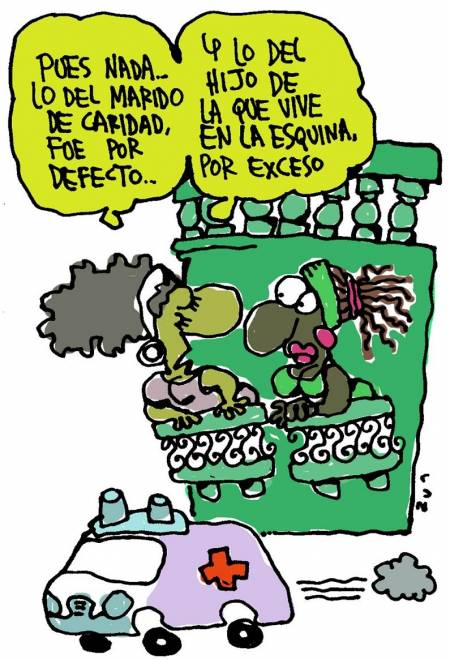
Viagra consumption Author: LAZ Published: 10/12/2019 | 10:54 pm
WOMAN #1: What happened to Caridad’s husband was for lack of…
WOMAN #2: And what happened to the lady that lives on the corner was due to an overdose.
in sex, it is fundamental to respect oneself and the other person.
Lara Castro, Spanish sexologist
Carlos is 19 years old. He studies engineering and is an attractive young man, intelligent and nice enough to arouse the interest of whomever he wants. His friends respect and support him, his relationships have been stable and his sexual life healthy, so far without surprises.
Like many young people, Carlos has felt the need to experiment to the maximum of his abilities. Even without the traumatic experiences to justify it, he decided to venture with “the famous little blue pill”, because they promised him that he would see the clouds and show them, in addition, to his roommate.
The outcome could have been magnificent, as other young people who were pleased insist on narrating, but Carlos ended up in a hospital ward with an intense pain in his penis, erect for more than three hours, and an unbearable headache. Luckily, it was enough to drain the limb with a syringe and there were no sequels.
According to street rumors and reaffirmed by specialists in Sexology and Urology in our country, in the last decade the number of young men who consume Viagra without a prescription, has risen worryingly. This is true both in its Cuban variant and products imported illegally under the name, not always reliable, Viagra.
The interesting thing about this phenomenon is that this drug is a vasodilator (dilates the vessels of the circulatory system). It doesn’t stimulate desire, and is intended for patients with erectile dysfunction after trying other therapies whose use involves fewer physical risks.
When employed by a young man who has no circulatory problems or erection difficulties, it can cause priapism, that continuous and painful erection of the penis that lasts several hours and requires surgical intervention to resolve.
Even without immediate traumatic episodes, it is a dangerous habit because it creates dependence and deepens the insecurity, low self-esteem or anxiety of the young person. In the long run, this can generate the feared dysfunction, but of psychological origin, explains psychiatrist and sexologist Elvia de Dios, therapist at the National Center for Sexual Education (Cenesex).
In addition, possible reactions to the chemical surpass the advantages that its consumption supposedly brings, if there is no basic cause, which is lack of erection. These include headaches, palpitations, facial redness, nasal congestion, dyspepsia … Added to this is that some men should not use it because they are allergic to its components or these interfere with their treatments for chronic illnesses (such as heart disease).
There are also restrictions for uncontrolled hypotensives and men with retinitis pigmentosa. This is because, according to the Cuban expert, international studies report vision damage, since this drug relaxes smooth muscles by inhibiting the production of the enzyme FDE-5 (5-phosphodiesterase) but can also inhibit FDE-6, vital for the retina.
In the new protocols of attention to sexual dysfunctions in our country (in the process of validation to be generalized throughout the health system), we insist on the rigor of the prescription of the drug, accompanied by other indications, such as its ingestion away from meals, low-fat diet in the previous hours and not taking more than one pill a day.
It is essential to demystify other aspects that young people handle inappropriately. Viagra does not protect against any STI and its use does not increase sexual appetite: without desire and prior stimulation, it does not lead to anything positive.
These insecure young people force a process that should be natural, spontaneous and pleasant for both parties, in an attempt to look good above all else. In that state, it doesn’t matter if you use alcohol, viagra or other natural aphrodisiacs: the expected effect is in your mind, even if your body suffers the undesirable consequences.
A healthy sexuality in all senses includes unlearning prejudices that point to the man as merely responsible for the sexual relationship. It takes into account that, at that moment, responsibilities are shared equally, so the only doses that must mediate between them are that of attraction and honesty.
Alberto Fernández’s Titanic Mission

Weeding Out the Wrongs:
The Titanic Mission Awaiting Alberto Fernández
To turn the page in Argentina you have to get out of the IMF fold, but first you have to grow the economy.
Posted: Saturday 07 December 2019 | 08:17:44 pm.
by Marina Menéndez Quintero
Translated and edited by Walter Lippmann for CubaNews.
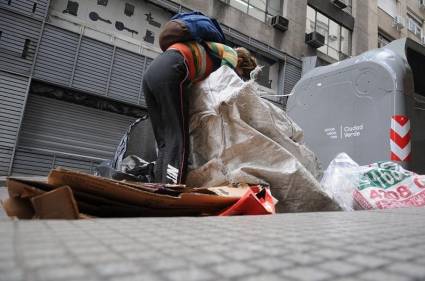
Repeated devaluations, rising inflation, stagnation, rising unemployment and adjustment measures agreed with the IMF explain the deterioration of the Argentine economy under Macri. Poverty affects 16 million people and the national industrial apparatus already completes a period of 18 consecutive months in decline. Author: Page 12 Published: 07/12/2019 | 07:41 pm
A decision announced a priori brings about the purposes Alberto Fernandez has in his portfolio for when he is sworn in as president. Within two days: Argentina is not going to accept the last pull of the scandalous $56 billion that Mauricio Macri sought from the IMF, It has been the largest loan granted by that institution in all its history. Nor will it negotiate more loans.
His will be a term that will be born under that Sword of Damocles, because the strong indebtedness agreed by Macri will still continue to hover over the country for some time. But Fernández will not allow the overruns with which the Fund manages the Governments to overfly it. No more recipes.
That is what would happen if the new president accepted the possibility – outlined recently by officials of the IMF – of signing another agreement for the country to receive more money lent to “help” – say the IMF officials – to pay what is owed …
Fernandez won’t do it. In the weeks since his election, he has reiterated the same idea: the country will not pay until the economy reactivates and grows.
With this conviction, he faced his first dialogue with the new head of the IMF, Kristalina Georgieva. She asked him, a few days ago, to apply policies of “fiscal viability” that allow the nation to pay off the debts contracted by the outgoing president.
The president-elect remained at “his 13” [stuck to his guns]. His administration, Fernández replied, will propose “a sustainable economic plan” and there will be no more fiscal “adjustments.”
However, Argentina has no choice but to pay, probably through renegotiation.
The new government – he has also reiterated this – will not declare Argentina in default (cessation of payments). This would mean that all credit and investor doors would be closed and, in addition, there are commitments made with private debt holders. But the incoming executive also refuses to tighten people’s belts just to favor, as Mauricio Macri has done until today, the eternal circle of indebtedness.
Looking Back…
The situation seems unusual in its difficulty, although it is not new. It resembles too much that of Argentina in 2003, when the late former president Néstor Kirchner took over the helm of an equally indebted country. Perhaps then with more factories closed and more hunger, and the nation was the prey of a boiling up that brought the beaten middle class to the streets, put pot-banking in vogue, and pushed a president, Fernando de la Rúa, out of the Casa Rosada. Then, at the climax of the impossibility of maneuvering, the government was forced to freeze the money of savers in the banks and decreed the so-called “corralito financiero” (financial corral).
Those spontaneous mobilizations were the result of several administrations as rabidly and ruthlessly neo-liberal as the one Macri is now concluding. He has also been repudiated in the streets by those who come back from the same evils, and even by those who did not experience them before but suffer them now.
Somehow, Macri has also been taken out of the house of government by the people, only “for the better”. The electoral outcome that gave victory to the Front for All is due, in good measure, to its ability to unite its main protagonists to the strength of Peronism but also -and a lot!- to that popular rejection that gave its punishment vote to the outgoing administration.
If you look at the numbers, these four years may outweigh the critical times of the 1990s and early 2000s in depredation. If, when Nestor Kirchner arrived, Argentina’s debt was around $170 billion dollars, last June external debts were at $283.567 billion: $7.819 billion more than a quarter ago, according to data from the National Statistics Institute cited in Argentine reports. That figure represents 80 percent of GDP! Almost the same as the country produces, because it has been in recession for three years.
The times for the cabinet of Alberto Fernandez are shortened if you take into account that for 2021 they will face payment deadlines of $38 billion of capital, and $16 billion in interest.
Kirchner, at the time, paid the Fund once and for all. He renegotiated with private bondholders, in transactions that meant important “removals” of Argentina’s debt.
Now is Alberto Fernandez time to act. How will he do it? How will he be allowed to do it? Because one observer has pointed out that the gendarmes of the Monetary Fund will react to the sovereign attitude of Alberto Fernandez, as dictated by the United States.
Deputies of the Popular Unity Party denounced the outgoing president in court for having indebted the country for more than $100 billion dollars, and the fact that $86 billion of them have fled.
Upon filing the complaint, Claudio Lozano and Jonatan Baldiviezo accused him of the crimes of non-compliance with his duties as a public official and abuse of authority,. They estimated that “if we do not suspend payments, the debt could choke Argentina’s recovery.”
Other debts
The weight of Macri’s external debt and the IMF’s persecution are not the only evils that the new government will have to fight economically.
An interesting article published in Página 12 by Alfredo Zaiat also points out the strong fiscal restrictions that have had to be implemented and will be against them. These include the exchange control implemented in the face of hit international reserves, weakened by the flight of foreign exchange; the weakened productive and labor scenario, the fall of the Argentine peso against the dollar (still at 63 to one) and the demands of trade and social sectors that have been hit hard by the crisis, such as teachers, scientists and state employees.
Fernandez knows where the core is to move the country forward. He hasn’t stopped working with a team of the Front for All since the good percentages obtained by his candidacy. With Cristina as vice-president, he announced that he would be the new head of state.
He has met with the provincial governors to ask for their support and also to demonstrate that he will govern by listening and counting on them. He has also spoken slowly with businessmen and industrialists, who have equally been hit by the macro crisis, to whom he gave guarantees of reactivation and asked for support.
The new government wants to return the workers’ salaries which had beenand fatten a little the slim pensions of the retirees; that there is no more need for soup kitchens, to improve access to education and health… And it has announced emerging social plans to alleviate that other macro debt: the one contracted with society.
The decision to incorporate two new ministries into the cabinet: Gender and Equity, and Habitat and Housing, illustrates where their paths go. This can also be seen in the announced Argentina program against hunger, and other social plans that will seek to provide a basic food basket to vulnerable households, and to guarantee potable water…
Those aspirations are a sign of how much citizenship needs. And the performance in the economic sphere on which many will depend; there everything is decided for Argentina today… or almost everything.
Iranian Man’s Marriage Annulled

Iranian Man’s Marriage with Nine-Year-old Girl Annulled After Photos Went Viral
Thee problem of marriages with girls in various Islamic countries is a constant struggle byactivists
By Juventud Rebelde digital@juventudrebelde.cu
Published: Wednesday 04 September 2019 | 09:46:25 am
A CubaNews translation.
Edited by Walter Lippmann.
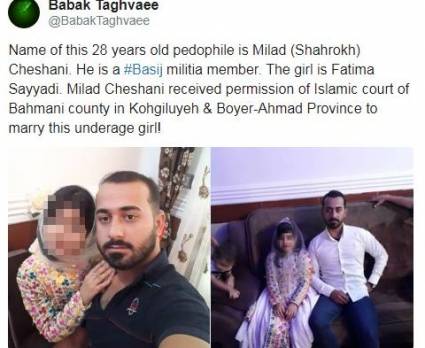
Iranian authorities took action on the matter when the fact was known Author: Twitter Published: 04/09/2019 | 09:43 am
Iranian authorities have demanded that an Islamic court in Bahmai County, Kohkiluyeh Province and Buyer Ahmad annul the marriage between a 28-year-old man and a 9-year-old girl, journalist Babak Taghvaee reported on his Twitter account.
This decision was taken under public pressure after the wedding images went viral on social networks, RT says.
The wedding video was made public by the journalist and women’s rights defender in Iran, Masih Alinejad.
This is a wedding party for a girl under 13 years old. I cried when I received this video … According to Islamic laws, a girl […] can get married but can’t choose her own dress, the activist said on her Twitter account when she posted the video.
Under Iranian law, a girl can get married after the age of 13, and a boy from the age of 15.
The pedophile #Basij militia member named Milad Cheshani has contacted the journalists who reported his marriage. He has claimed that it is just temporary marriage. He also has threatened the journalists who criticized him for act of pedophilia!!https://t.co/1xqOpEJVZr
— Babak Taghvaee (@BabakTaghvaee) September 3, 2019
According to 2015 data, every seven seconds a girl under 15 gets married somewhere in the world, according to the NGO Save the Children. Meanwhile, India is the country with the highest rate of underage wives, according to statistics from the same year, more than 24.5 million marry before they turn 18.
US DSA in Solidarity with Cuba

Largest U.S. Socialist Organization in Solidarity with Cuba
The organization condemned Washington’s policies towards the Caribbean country which have had a devastating effect and have hindered the development of solidarity ties between the citizens of both countries.
———————————————————————————————
Author: Web Editor | internet@granma.cu
September 2, 2019 09:09:14
A CubaNews translation.
Edited by Walter Lippmann.

Democratic Socialist of America (DSA) Photo: Prensa Latina
Washington, The Democratic Socialist Organization of America (DSA) expressed its solidarity with the people of Cuba and expressed its categorical opposition to the economic, commercial and financial blockade that the United States maintains today against the island.
DSA, which identifies itself as the largest socialist organization in the United States, condemned that Washington’s policies toward the Caribbean country have had a devastating effect on the Cuban people and have hindered the development of solidarity ties between the citizens of both countries.
In a statement approved by its National Political Committee and released this week, the group said it opposes U.S. imperialism and economic sanctions or other actions that would undermine the self-determination of the Cuban people.
“We also oppose the continued existence of the U.S. Naval Base at Guantánamo Bay,” added the communiqué regarding the military enclave maintained by Washington in eastern Cuba against the will of the government and people of the island.
According to the document, the group will work with other organizations in solidarity with Cuba to achieve its objective of defending the sovereignty of the largest of the Antilles, subjected to the siege imposed by the United States almost 60 years ago.
The text also cited a communiqué issued by DSA in 2014, when the administration of former President Barack Obama and the government of the Caribbean country announced the decision to begin a process of normalization of relations, now held back by the Donald Trump administration.
Our government’s actions were never designed to help the Cuban people, but rather to appease U.S. right-wing citizens of Cuban origin and punish a country that rejected imperialism and capitalism, the group said.
We hope that the normalization of relations will reduce the negative actions of the United States in the future, the organization added at that time.
The new declaration on Cuba was the result of the provisions of Resolution 62 of the biannual convention held by the DSA last August 2-4 in Atlanta, Georgia.
According to an article published in The New York Times earlier that month, Democratic Socialists of America went from 5,000 members three years ago to 56,000 today.
Members include Democratic Congresswomen Alexandria Ocasio-Cortez and Rashida Tlaib, as well as more than 20 local elected officials from across the country.
+++++++++++++++++
TEXT OF DSA STATEMENT ON CUBA:
https://www.dsausa.org/statements/statement-on-cuba/
Peruvian women demand end to femicide

Peruvian women demand an end to gender-based violence
We have to promote a culture free of machismo, said Peruvian Minister of Women and Vulnerable Populations Gloria Montenegro, who was present at the popular demonstration organized by the collective Ni Una Menos.
By Juventud Rebelde
digital@juventudrebelde.cu
Sunday 18 August 2019 | 09:42:37 am.
A CubaNews translation.
Edited by Walter Lippmann.
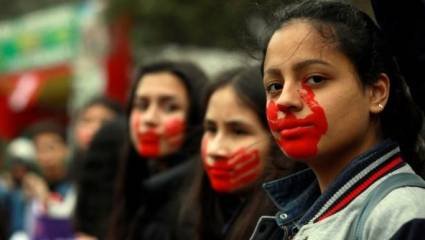 LIMA, August 18.- This Saturday thousands of people held a demonstration in the Peruvian capital called Ni una menos. Women’s organizations demanded protection in the face of the growing number of cases of femicide in the South American country.
LIMA, August 18.- This Saturday thousands of people held a demonstration in the Peruvian capital called Ni una menos. Women’s organizations demanded protection in the face of the growing number of cases of femicide in the South American country.
It was the fourth edition of the annual march to demand an end to femicide, which this year stands at 105, while cases of attempted femicide total about 150 more so far in 2019.
We have to promote a culture free of machismo, said Peruvian Minister of Women and Vulnerable Populations Gloria Montenegro, who was present at the demonstration organized by the collective Ni Una Menos, reports Telesur.
Alejandra Ballón, a spokeswoman for the group, said she was dismayed by the figure of 105 femicides, which means that in Peru a woman is murdered every day.
But there are about 250 femicide attempts and it must be said that for each attempt of femicide there are children, parents, grandparents, a whole family that is dismayed because it has a direct relative who is a victim, Barrón added.
She mentioned that in 2018 there were more than 12,000 cases of rape and that, of those cases, 60 percent of the aggressors are family members and of the adolescents who become pregnant, 90 percent are incest, she said.
Another participant in the demonstration, which toured the streets of downtown Lima, was attorney Arlette Contreras, who denounced the fact that women are also victims of the state through its operators who deny access to justice.
We are in the streets again to denounce gender violence by the aggressors, as well as to denounce the gender violence of the Peruvian State that affects, harms and hurts women victims and survivors, said the jurist.
Facebook and the Surveillance of its Users

Facebook and the Surveillance of its Users
The social network admits to having paid external contractors to listen to and transcribe conversations.
By Juventud Rebelde
Wednesday 14 August 2019 | 09:51:48 pm.
A CubaNews translation. Edited by Walter Lippmann.

Facebook Author: Juventud Rebelde Posted: 08/14/2019 | 09:11 pm
Facebook, the company founded by Mark Zuckerberg, explains that the purpose of the practice of listening to and transcribing conversations from its users was to test the functioning of its artificial intelligence system.
“Hundreds” of external Facebook contractors have listened to and decrypted voice messages that users of the technology giant send in their chats on Facebook Messenger, Bloomberg revealed on Tuesday, quoting sources familiar with the project.
According to its statements, the company paid them to transcribe audio conversations, but did not explain where the recordings were from – several of them with vulgar content – were obtained and why they had to be deciphered.
Facebook has confirmed the information in this regard, specifying that the project ended only a few days ago. “Like Apple and Google, we stopped the human review of audios more than a week ago,” said the company. They also noted that affected users gave their consent to the practice by checking the option of transcription of their recordings in the “Settings” of Facebook Messenger.
Facebook clarified that the aim of the project was to test the functioning of its artificial intelligence system, said RT, which describes it as “a new scandal.”
This is not the first report on the violation of the privacy of users of technological giants. In early August, the corporations Google, Apple and Amazon modified their privacy policies, responding to a wave of criticism caused by reports that they listen to and transcribe audio recordings recorded by their virtual assistants – Google Assistant, Siri and Alexa, respectively – without the consent of the users.
Thus, on August 1, German regulators announced that Google had informed them that it had suspended the transcription of conversations for at least three months. In turn, Amazon allowed Alexa users to delete voice recordings from a database accessible to company employees and contractors on Aug. 2.
Transfermóvil Offers New Services

Transfermóvil offers new services
As of this Wednesday, an updated version of Transfermóvil is available, the application that allows you to manage several public services through online payment.
Thursday 08 August 2019 | 12:06:11 am
A CubaNews translation.
Edited by Walter Lippmann.
 As of this Wednesday, an updated version of Transfermóvil is available, the application that allows managing various public services through online payment, developed jointly with Etecsa, Banco Popular de Ahorro, Banco de Crédito y Comercio and Banco Metropolitano.
As of this Wednesday, an updated version of Transfermóvil is available, the application that allows managing various public services through online payment, developed jointly with Etecsa, Banco Popular de Ahorro, Banco de Crédito y Comercio and Banco Metropolitano.
On this occasion, the Nauta Top-Up and Mobile Micro Top-Up services are added, features that are free of charge and do not consume mobile data, according to Etecsa’s Facebook page.
Among the services offered are banking, public and communications. You can download the APK from Etecsa’s websites (www.etecsa.cu); Apklis (www.apklis.cu), through the Central Bank’s websites and through Cubacel’s Facebook page.
Mayra Arevich, executive president of Etecsa, in her Twitter account commented: “Today we are launching a new version of Transfermóvil, a Cuban application that facilitates payment management for its clients. We will continue this August adding new services”.
Transfermóvil is a computer platform for cellular network subscribers. It allows them to make online payments for public services and to manage telecommunications services from any mobile terminal, using their Telebanca card associated with one of their bank cards, according to the bank to which they belong.
Harriet Tubman will have to wait

Harriet Tubman will have to wait for her $20 bill.
The merits of the one chosen to illustrate the twenty dollar bills were obvious, although to tell the truth, not to the “tastes” of the current president.
 By Juana Carrasco Martín
By Juana Carrasco Martín
juana@juventudrebelde.cu
A CubaNews translation. Edited by Walter Lippmann.
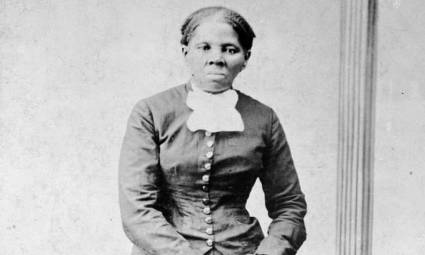 “For the first time, a woman will appear on U.S. bills.” “The face of Harriet Tubman, a former slave and abolitionist militant, will replace President Andrew Jackson on the $20 bills. On April 20, 2016, almost at the end of Barack Obama’s presidential term, these were headlines in the U.S. and world press – because of the power and globalized scope of the U.S. currency.
“For the first time, a woman will appear on U.S. bills.” “The face of Harriet Tubman, a former slave and abolitionist militant, will replace President Andrew Jackson on the $20 bills. On April 20, 2016, almost at the end of Barack Obama’s presidential term, these were headlines in the U.S. and world press – because of the power and globalized scope of the U.S. currency.
Harriet Tubman was born into slavery in 1820, escaped from inhumane captivity in 1849, and went on to organize slave rescue networks, many of them to Canada. During the American Civil War (1861-1865) she served with the Union army as a cook, nurse and even a spy. At the end of her life, Tubman – who died in 1913 at the age of 93 – helped organize movements for women’s suffrage.
Precisely, the new bill was to be circulated no later than 2020 to commemorate the centennial of the 19th Amendment to the U.S. Constitution, which gave women the right to vote.
A discriminatory designation for women was to be broken, and Tubman’s election to place her alongside other American heroes who are honored in the monetary system was not easy. The consultations lasted almost a year, [there were] thousands of proposals, and in the end, the finalists included First Lady Eleanor Roosevelt and the legendary leader of the movement against racial segregation and civil rights of the 1950s, Rosa Parks, the courageous young woman who, on December 1, 1955, in Montgomery, Alabama, refused to give up her bus seat to a white man, as racist laws and customs dictated.
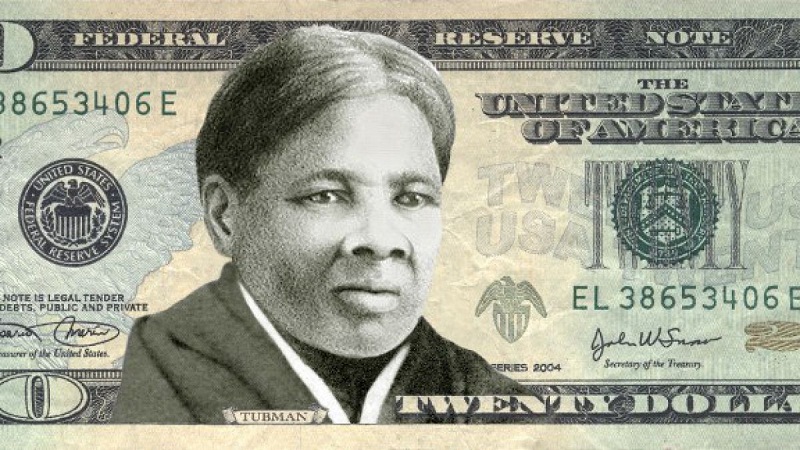
But, if in 2016 the then-Secretary of the Treasury Jacob Lew had already seen a photo and proof of design of the bill with the face of Harriet Tubman, why are there still no effective steps to replace the paper money that has General Andrew Jackson as the protagonist, even if it is moved to the reverse [side] as agreed?

Jackson also has a history: Owner of hundreds of slaves who worked on his Hermitage Plantation, he began in the military camp during the War of Independence against the British. He earned the rank of general by waging war on the Indians, first on the Creek, who called him Jacksa Chula Harjo, which means “Jackson, old and fierce”, and on to the Seminolas, among whom he was known as “sharp knife”. As the seventh president of the United States, Andrew Jackson stood out especially for having signed the Indian Removal Act, guaranteeing the theft of their ancestral lands and provoking a march toward Oklahoma in which thousands of natives died, and he was given the name of “Trail of Tears.
In 2016, Twitter overflowed with predictable messages from conservatives and traditionalists – not to say also racists – who saw the decision as an affront from the forces they called “politically correct”.
There werer also tweets in favor of the inclusion of the ex-slave. A historian commented in the Huffington Post: “In 2016, the United States faces serious problems related to poverty, inequality, and racism. The arrival of Harriet Tubman on the $20 bill will not solve these problems. Its purpose is to present itself as a vivid and powerful symbol of freedom, equality, and inclusion. It is up to us citizens to make use of it.
But then-Republican presidential candidate Donald Trump said in 2016 that he opposed the decision that honored Tubman. He called it “pure political correctness”. Rejecting the measure was already an insult to both women and the African American population, and he multiplied it by suggesting that Harriet Tubman should be on the two-dollar bill, [which has been] discontinued in the U.S. monetary system.
What is real now is that the current Secretary of the Treasury, Steven Mnuchin, said last Wednesday, May 22, that plans to replace Andrew Jackson’s portrait on the $20 bill by abolitionist leader Harriet Tubman are on hold until at least 2026.
Mnuchin was questioned by Massachusetts Democratic legislator Ayanna Pressley, who told him: “The American people understand the importance of representation on the banknotes of the world’s most powerful economy. … Do you support Harriet Tubman on the $20 bill?” and the cantifleus came as a response: “I have not made any decision since it refers to that decision not being made, in, as I have said (…) until 2026 probably.”
The representative reminded him that there was a national community process, to which Mnuchen argued: “again, it is a decision of the Treasury Department. Now my decision is focused on security functions”, referring to the fact that they could not be falsified…
Andrew Jackson is an admired president and perhaps even Donald Trump’s favorite. Some historians claim that Jackson had an arrogant and difficult character…
Women in the Ring

Boxing: Women in the Ring
Although boxing is inherent to our sporting tradition, several voices linked to Cuban pugilism advocate the inclusion of our women in this sport, a decision that falls to the authorities of this discipline on the island.
By Luis Autié Cantón digital@juventudrebelde.cu
A CubaNews translation.
Edited by Walter Lippmann.
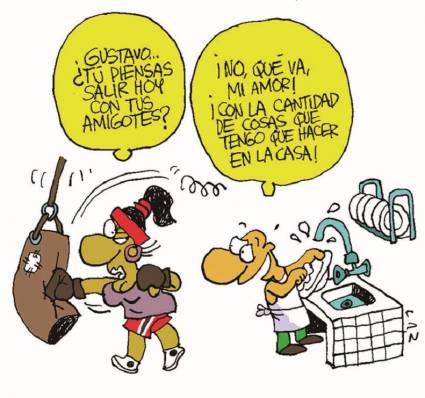
SHE: Gustavo… You’re thinking of going out today with your cronies? HE: I can’t go, my love, with all the things I’ve go to do at home!
Cuba is lagging behind. And no, I’m not talking about transportation or technology. I’m talking about boxing. Our men’s squad are championss because of their respect for each other. To name the four letters in a pugilistic event is to sow, among rivals, fear of the coming storm. It is to know that they will have to die on the canvas to defeat ours. We’ve earned that right over the years. But, I insist, we are lagging behind. When the next edition of the World Series begins, if it sees the light after the corruption scandals at the highest levels of the International Amateur Boxing Association (AIBA), it will be competing in eight male divisions and, listen well, in four female divisions. While this is not yet confirmed, when the river sounds…
And our female boxing, dear reader, doesn’t even bring stones.
Tamers
Nelsy Torres is 21 years old and gets up early every day to train. Her greatest aspiration is to be able to compete officially.
“As a boxer, I need boxing to be legalized because I want to fulfill a dream. If they don’t give me the opportunity, they are slowing down women’s rights. While other countries advance with results, Cuba is lagging behind. I’m sure we can have the same results as men. Even better. We can’t wait for generations of boxers to go by, and we can’t get anywhere,” she says impotently.
Rolando Acebal, helmsman of our main boxing squad, confesses that he has not seen any girl fight here in Cuba, but he does not hide his opinion that we could have good exponents in the future. “Currently, in the world, the countries that practice male boxing also practice female boxing, and no harm has been seen to the health of the athletes. If it had been any other way, it would have been detected and it would all be over.
“There are Cuban coaches abroad who work with women’s boxing. I think we should not deny that right to women who have the desire and have requested the opportunity to train and compete. There are even mothers advocating for their daughters’ opportunity. We’ve been told that they’re analyzing, doing medical studies, but we’ve been doing it for a few years now and we’re lagging behind in that sense.
The Story: A Ring on the Stand
The girls with their jabs, their uppercuts and their hooks are not rain that just fell. Since the 18th century, there have been sports fights between women in this discipline. The Londoner Elizabeth Wilkinson, in 1722, is the oldest known champion. A little more than a century later, it was fought for the first time on this side of the Atlantic, when the bell rang for the North Americans Nell Saunders and Rose Harland to face each other, ring by ring, in 1876, on American soil.
In 1954, almost 80 years later, a women’s poster could be seen on television. One of the fighters who appeared in the “magic box” was Barbara Buttrick, one of the most famous boxers of all time.
The United States was the country where women’s boxing developed the most, following that fight of the nineteenth century. Between 1975 and 1978 some women applied for boxing licenses. Particularly important was the successful trial that the boxers Cathy “Cat” Davis, Jackie Tonawanda and Marian “Lady Tyger” Trimiar carried out against the state of New York, due to the rejection of their requests for licenses. The wide media coverage of these events directed public attention to this discipline.
However, the persistence of restrictions and prejudices led Lady Tyger to go on a one-month hunger strike for women’s rights in boxing in 1987.
As can be seen, some of the most important fights in the history of women’s pugilism have not been fought on canvas, but in the courts. Five years after that hunger strike, in 1992, Massachusetts boxer Gail Grandchamp knocked the system out by getting the state Supreme Court to recognize her right to box after eight years of trial. At the time, the Court held that it was illegal for an official to deny a license to box on the sole ground of the applicant’s sex. However, Grandchamp was unable to practice boxing because he had already exceeded the maximum age of 36 for amateur boxers.
In 1993, the USA Boxing Association, which is responsible for amateur boxing in the United States, agreed to regulate women’s boxing throughout the country after 16-year-old Dallas Malloy won a federal discrimination lawsuit in court.
Despite all the official and unofficial history, of all that baggage that goes back to the eighteenth century, it was not until March 15, 1996, that occurs the fact that is considered by many as the birth of modern female professional boxing. We refer, in this case, to the fight between Christy Martin and Deirdre Gogarty. That same year, the UK Amateur Boxing Association repealed the 1880 ban on boxing for women, and a year later, in July 1997, the first U.S. women’s boxing championship was held. In the following years, other countries were authorizing and organizing this discipline, in the women’s section, and were consecrated world champions in all categories. That is why it is difficult to understand that, in a country like ours, where neither race nor gender distinctions are established, we still do not have the legal or institutional instruments that allow our girls to get into a ring and defend the four-letter t-shirt with their gloves.
Boxing was first included in the modern Olympic program in 1904 in St. Louis, but it wasn’t until London 2012 that women were able to fight under the five hoops.
At the British event, women competed in three weight categories and a total of 36 boxers took part. The Executive Committee of the International Olympic Committee (IOC) still refused to include women’s pugilism as a demonstration sport in the program of the Games four years earlier in Beijing.
The time for women’s boxing matches in summer events is four rounds, two minutes each, unlike men, who fight in three three-minute moments.
If we consider our route, in which boxing has undoubtedly been the sport with the most Olympic and world titles in our history, nothing takes away the right to think that we could, with a little time, become a power of female pugilism. I sign it, and I stamp it.
Cuba, noqueada?
Perhaps one of the aspects that most restrains the Cuban Boxing Federation is the issue of the safety of girls in the ring. In this regard, Rafael Lerena Naples, head of the medical corps of the national team of this sport, believes that there is nothing to worry about in this particular case.
“Unfortunately, we don’t have an athlete in the squad at the moment. The problem is that the competent authorities have not yet authorized Cuban women’s boxing to begin. We are waiting for that”.
The doctor says that “there has never been any damage to the health of these girls”. In this regard, he explains that “the risk in sport is in all specialties. People are at risk of being injured, even walking down the street. However, the risks in high performance are always minimized. The Cuban athlete has entered satisfactorily in all the sports disciplines and for having, especially in the specialties of combat. So why not in boxing? Cuba has demonstrated, with results, quality in boxing since the triumph of the Revolution, and has made it clear that we are a source, a quarry, of good boxers. Why not have boxers”?
“Bebo” Alcántara, 76 years old, ex-bodeguero and boxing fan since childhood, does not understand why women should fight in a ring. “Boxing is a gentleman’s sport. My father always told me this when my mother protested against the violence of the fights. Now, I love boxing, but I don’t see any attraction in seeing two women “punching each other”. Women are more delicate. I think they would lose even femininity.
On the other hand, the soul of the ring, the protagonists, who live daily the intrigulis of this sport, have favorable opinions on the development of them in the pugilism. The light welter Andy Cruz, considered the most complete boxer in Cuba at the moment, expressed his support: “I like very much that they also take into account female boxing. I have seen Cuban women fight, many have come from other sports. I have liked them, I have seen that they have quality and I know that in the future they can achieve great things. I am sure that in a short time they will reach the same height that male boxing has achieved.
Rolando Acebal explains that in Cuba women have had results in sports such as judo, weights or wrestling. “Traditionally, the Cuban woman is brave, a fighter, sacrificed. They are the example of Mariana Grajales, and have demonstrated over the years that they are capable of performing any task.
Hopefully, these voices will serve as a straight line to the chin to change mentalities. Hopefully, the brake and the lack of decision will not recover to the protection count of logic. We want to hear our National Anthem while, on a ring, the referee raises his arm to a Cuban girl.
Approve women’s boxing? – Letters to the web edition
Indalecia Herrera
Sunday 14 April 2019 | 01:03:50 am.
No female boxing.
Alexander
Sunday 14 April 2019 | 09:06:52 am
I am a passionate lover of boxing, in all its dimensions. I do not think it is right to truncate the wishes of any woman, who voluntarily loves this sport and wants to practice it. They want to see history more beautiful than Mary Kom’s. For me the best boxer of all time, within the amateur world. The one that fought against all adversity and prejudices and became multiple Olympic champion. Cuba is left behind, many times for banal justifications. the personal decision of the individuals to respect themselves, as long as it does not affect the general society. And approving female boxing, does not affect anyone. Let’s step forward and in a few years we will have our champions, I’m sure of that. The potential is.
Dany
Sunday 14 April 2019 | 10:07:54 am
Very much in agreement with this inclusion of women’s boxing we are missing medals and opportunities and above all we have not given women their opportunity to demonstrate their boxing qualities that I have no doubt that in a short time they resemble male pairs
Julio Tejera
Sunday 14 April 2019 | 01:42:06 pm
Yesterday I saw a photo on Facebook where in the foreground you can see a woman with a machine gun and in the background a man with an apron in front of the sink and a text almost the same as the caricature .. What a strange coincidence.
Ramon
Sunday 14 April 2019 | 04:37:18 pm.
No to Boxing for women ??? And when they have taken the rifle? If we are going to talk about danger.
José
Sunday 14 April 2019 | 08:47:04 pm
Not allowing female boxing is simply discrimination against women. Only they must decide if they are boxers or not. Why do some people believe they have the right to decide what only they should do? For a long time the female weightlifting was stopped.
Charles
Monday 15 April 2019 | 08:51:53 am.
That other countries do something is not an argument for us to imitate them. But undoubtedly women have the right to practice any sport according to their physical characteristics. I personally do not like boxing and least of all feminine.
Joel Iglesias
Monday 15 April 2019 | 07:47:19 pm.
Well if they want to promote women’s boxing or drawing serves, very badly, each person independent of gender has the same rights, at least is what they enact.
Reinaldo Cedeño
Tuesday 16 April 2019 | 01:25:20 am.
it’s horaaa !!!
Nandy
Tuesday 16 April 2019 | 04:16:15 pm.
If it is found that there is no risk for women, that is, that does not cause any disorder to women because of the blows they may receive in the breasts, etc., I agree that it should be practiced; That the FMC of his opinion on the matter, because I am convinced that they will investigate before giving an opinion.
Homophobia and Transphobia
 Homophobia and Transphobia in Cuba
Homophobia and Transphobia in Cuba
Online Discussion with Cenesex
Why are schools the main scenario of this day against homophobia? How can we face a situation of homophobic and transphobic bullying in the school environment? How is it possible to strengthen the sex education program of the country’s school system? These questions and the ones you left us were answered by JR’s Multimedia Editor starting at 10:00 in the morning.
Juventud Rebelde
digital@juventudrebelde.cu
9 de Mayo del 2017 11:56:38 CDT
A CubaNews translation by Walter Lippmann.
Posted: Tuesday May 9, 2017 | 11:56:38 am. Updated: Friday 22 September 2017 | 12:41:44 am.
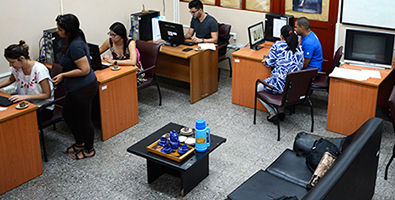
Online conversation with Cenesex about homophobia and transphobia in Cuba. Author: Abel Rojas Barallobre Published: 21/09/2017 | 06:09 pm
This Friday, the community of readers of Juventud Rebelde will have the opportunity to dialogue online with specialists from the Centro Nacional de Educación Sexual (Cenesex), about the 10th Cuban Day against Homophobia and Transphobia.

Juventud Rebelde recognizes the sustained work of Cenesex by including it. Photo: Abel Rojas Barallobre
Mariela Castro Espín, director of Cenesex; Manuel Vázquez Sejido, deputy director of the center and National Coordinator of Community Social Networks; Andy Aquino Agüero, head of the Department of Community Work and director of the Transgéneros Cuba Project; Ángela L. Urquiza Ramessur, specialist in the Department of Community Work and member of the National Commission for Comprehensive Care of Trans People; Yoanka Rodney, Doctor of Science and professor at the “Enrique José Varona” University of Pedagogical Sciences; Susana Hernández Martín, journalist of the Communication Department of Cenesex, Francisco Rodríguez Cruz, activist, collaborator with Cenesex and journalist of the newspaper Trabajadores, exchange with cybernauts about the prejudices that can subsist in the scenario of social learning, in the advance of public policies at the country level, and in aspects related to citizen and political opinion about the LGBT population (lesbians, gays, bisexuals, transsexuals).
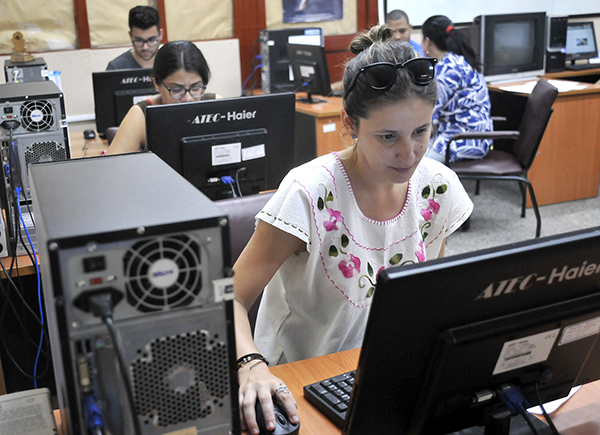
Photo: Abel Rojas Barallobre
[Follow the publications of Mariela Castro through her official Facebook page https://www.facebook.com/castroespinmariela ]
Why are schools the main scenario of this day? How can we face a situation of homophobic and transphobic bullying in the school environment? How is it possible to strengthen the sexual education program of the country’s school system? These are some of the concerns that will be answered.
The director of our newspaper Yailín Orta welcomed them to the Cenesex team and praised the work of that center in the defense of gender equality and the promotion of the rights of LGBTI people; at the same time, she gave them a collection of books published by Juventud Rebelde.
[You can visit the CENESEX accounts on Facebook and Twitter for more information on this day]
Joel García: What do you think has been Cenesex’s greatest achievement in this decade? What has been its greatest unfulfilled goal?
Francisco Rodríguez Cruz: I consider that the main achievement of Cenesex in this decade, in terms of confronting homophobia and transphobia, would be the placement of the topic in public debate. [It has brought about] a change in the perception of a significant part of our population that now assumes as an anti-value, that is, something negative and socially repudiable, the fact of being a homophobic or transphobic person. This is palpable even among individuals who still harbor prejudices toward sexual orientations and gender identities that do not conform to the heterosexist norm. They have begun to express more tolerant attitudes that, over time, could evolve toward full acceptance and respect for sexual diversity. The great objective that has not been achieved would be to make more concrete these advances in terms of greater political and social consensus on the need to confront discrimination based on sexual orientation and gender identity. [To achieve this] all the legal norms and public policies are still required so that lesbians, gays, bisexuals and trans people can enjoy the same rights as the rest of the Cuban people.

Photo: Abel Rojas Barallobre
Juan Carlos Ramírez: How can you find out about the things Cenesex does outside of the days against homophobia? Do you have your own channel of communication? I want to be an activist, to help.
Francisco Rodríguez Cruz: In addition to all the information it disseminates on its institutional website www.cenesex.org, Cenesex develops a broad and systematic relationship with the media that requests the participation of its specialists in radio and television programs and specialized pages of the print media, for the approach and dissemination of all the actions of the National Education and Sexual Health Program.
It also has the Cenesex publishing imprint, which publishes numerous scientific publications during the year, as well as the magazine Sexología y Sociedad, with academic approaches to the multiple topics studied by the institution.
In terms of activism, there are currently six community social networks linked to Cenesex: the TransCuba network of trans people and their families; the lesbian and bisexual women’s network; the Humanity for Diversity network; the youth network for sexual health and rights; the network of jurists for sexual rights; and the network of social workers. Most of them have groups or individuals who collaborate or participate in their work in various territories of the country, not only in the capital.
These social networks linked to Cenesex promote, throughout the year, a great number of training and interaction actions with the community. They have great autonomy in their activist work, based on work objectives and specific operating principles for each case. We invite you to visit us and inquire about the contents addressed by each network, to integrate and participate in the one that is closest to your interests, affinities and possibilities.
Yasmany: Why don’t you use a .cu domain, so that everyone can access it? Before Cenesex had its own website and now? I would like to know about the event that will take place in Cayo Coco during the vacations on the subject. I’m a lawyer.
Susana Hernández Martín: Hello Yasmany, you are right in what you propose to us as to have our page in a Cuban domain, it would be the best and it is what we want. In fact, we are currently in the process of “moving” our site, which is .org to .cu so that everyone in the country can visit it even if they don’t have an Internet connection.
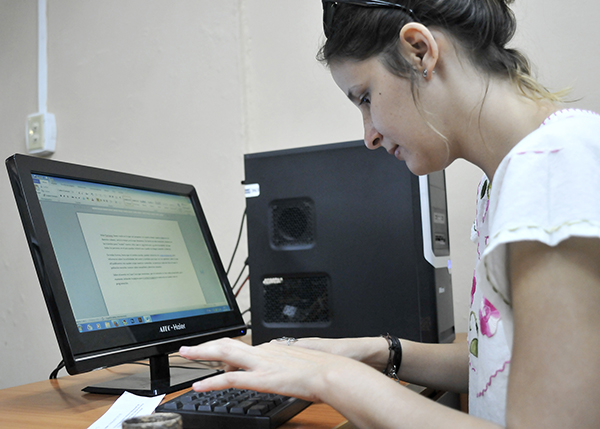
Photo: Abel Rojas Barallobre
Anyway, until the change happens, you can visit us at: www.cenesex.org to be informed about the activities of the center and also so that with your opinions about what we publish there help us to make our contents more and more like what the population needs to know about sexuality and sexual rights.
About the event in Cayo Coco that you mention, for the moment there is nothing projected, but keep visiting the page so that you will learn all the events and days that we do inside and outside Havana.
Dalia: Well I guess when they say school they mean high school, high school and college, right? I always repudiate homophobes but I’m worried that this campaign will push the limits and confuse our children. I honestly have nothing against sexual orientations, that’s everyone’s business in their intimate spaces but EYE it’s very difficult to explain to a child who is just understanding the love between two people of the same sex or the fact that a boy wears skirt and makeup? What to do in this situation!? I think that first to access the mentality of the future adult must teach respect for others and their right to be happy, I do not think that a gay person is just that, is also a person, daughter (or), aunt (or), friend (or), teacher (or), I myself have great admiration for my professor of Psychology and I have never thought about what he does with his partner. For me, respect comes first and foremost.
Angela L. Urquiza Ramessur: Dalia, first of all I want to say that I think it is very positive that you participate in this space, it is with the participation of all Cuban society that we aspire to make it inclusive.
When we say schools we mean all school spaces, sexuality (which is much more than coitus and genitality) is an integral part of human beings and is always expressed, with its particular characteristics in each stage of development. From this logic, we also refer to primary education, where girls and boys need to understand how sexuality is expressed in people, in ALL people. In this way they do not get confused and grow up thinking that the heterosexual and gender identity variant as it is the only existing and valid or, worse, that it is okay to insult, hit, exclude other people under that premise.
We cannot afford to be naïve thinking that it is okay to leave the sexuality education of our children totally to chance, because yes, they are receiving content on this all the time and from dissimilar sources, often wrong and lacking the human values defended by our social project. So, yes, we agree that the “future adult” must be taught “respect for others and their right to be happy”… Also that their actions have an effect on that perception of happiness, that they are responsible for their actions.
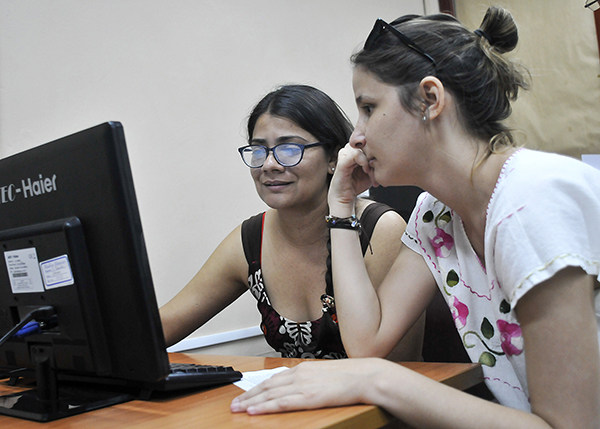
Photo: Abel Rojas Barallobre
Another important point is the one referring to “intimate spaces”. Non-heterosexual people have the right to hold hands, to express their feelings with gestures of affection, to talk about sexual relations, to express their sexuality in the public spheres as heterosexual people do. It is not a question of taking away anyone’s rights, but of guaranteeing the same rights for all people. A fair, equitable position is that of inclusion, not that of excluding human beings from common spaces under prejudiced premises, whether these spaces are real, imaginary or symbolic.
Finally, human beings are diverse and this diversity can be a common space for being human. Among these children, adolescents and young people learning about the world there are many who love or will love people of the same sex.. Many have gender identities different from those historically normed, and they need to know that they are normal and have the same right as other people. Sometimes we think that children will find it as difficult to understand love and desire as we do, but that is not necessarily the case. Questions to ask when children, in their dealings in the world, find trans people, you already have the answer: “Respect is first and foremost”.
JAHD: If marriage between LGBT people is not legally permitted in our country and there is no prospect of this being achieved in the medium term, what legal variants can be applied according to the laws in force to protect stable couples from separations, deaths and similar events?
Andy lay: Very timely this talk in cyberspace I would like to know how far has been advanced with the issue of gay marriage in Cuba and the main policies for the LGBT population in our country.
Manuel Vázquez Sejido: At the moment, there is no possibility of legally recognizing marriage between people of the same sex, although I am optimistic and believe that there are sufficient conditions to move towards a legislative amendment that will allow everyone to have access to the institution of marriage. Notwithstanding the above, there are some “legal solutions” that can be used to protect same-sex couples from situations that may arise with the break-up of the couple or the death of one of its members. For example, the possibility of acquiring property in co-ownership, donating property to the other member of the couple in situations in which the absence of one of them is foreseeable or granting a will.
RGC: School bullying is not necessarily related to homophobic and transphobic behavior, it is good that this topic is touched on, it should be started by educators who should not allow it or be part of it, children are very sensitive to this, goes from the bullyng by the physical aspect, the very fat or very skinny, the directed to those who have economic problems, those who do not use name-brand clothing, the one that refuses to smoke or those who refuse to intimate to that age, to those who do not like noise and prefer tranquility, the least intelligent and even the very intelligent are separated are the center of ridicule that can be very hurtful, educators have maximum responsibility and educates the relatives of the harassers, no one is born being a harasser, I think there should be disciplinary and legal measures in this regard, social education is essential but must be supported by legal penalties, our society must learn a lot, that is educated from the earliest ages, then we can talk about marriage in the LGBT community. They know they should not even be called that they are from that community, we are all Cubans independent of sexual inclinations and physical appearance, from the moment we say gay community, and that is discriminatory, separates the concept of “Cubans”, the same with those who say Afro-Cubans, are separating a group of “Cubans”, we all have a mixture of different cultures, we are human beings born on this island, Whether we are physically beautiful or ugly, then we are Cubans, the mentality is that we should all integrate into a better society, participatory, where everyone brings the best of himself to society, the one who contributes the most with his talent, knowledge, work, that is special, that is integrated and has synergistic effect towards the rest, I do not like that kind of separatism “gay community”, “Afro-Cuban”, etc… Let’s leave this nonsense far from us, we all have to integrate ourselves in social development, educating and this education must have legal support to be able to sanction those who impede integration, education in the human being also implies control of behavior, for something legality was invented.
Francisco Rodríguez Cruz: I share practically all his points of view, in particular, his concern for the unity that we find so expensive for the Cuban revolutionary and socialist project. Nevertheless, when there are groups of people or population sectors that suffer some kind of social disadvantage in terms of access to certain opportunities or not having all their rights guaranteed, it is logical, inevitable and necessary to make visible the problems that affect them, so that the rest of society identifies and resolves those deficiencies that hurt other people in their own midst. In other words, in order to achieve the integration into the social development to which you aspire, it may be inevitable to make this transition through certain specificities that distinguish and place certain human groups in difficulties. This will lead to better thinking about and implementing ways of guaranteeing the legal support required to avoid harassment and redress injustices. Acknowledging the existence of such differences would even allow us to prevent, rather than sanction, the inappropriate behaviors and actions that sometimes occur.
Pedro: I would like to know if it is possible to build or if there is a Cuban LGBT movement?
Manuel Vázquez Sejido: It is a complex question, especially because it has to do with the different conceptions of this particular phenomenon. Therefore, it is important to emphasize that my position on this matter is influenced by the vision I have on the subject. In Cuba there is an important group of activists who have organized themselves and form part of different networks, for example: Trans People, Families and Couples Network (TransCuba), the Lesbian and Bisexual Women’s Network, the Network of Jurists for Sexual Rights, the Youth Network for Health and Sexual Rights, the Humanity for Diversity Network, and the Network of Workers for Comprehensive Sexuality Education. We are talking about more than 4,000 activists trained throughout the island from the support and training spaces generated by the National Center for Sexuality Education since the beginning of 2000. Each of these networks has very specific objectives and unites in the main task of contributing to the recognition and guarantee of sexual rights as human rights without distinction of any kind. There is definitely an important group of people in our country who join forces to advance in these issues of social justice, a group of people who are not only lesbian, gay, bisexual, trans and intersex, but also include allies and fundamental allies, heterosexual people. Cenesex has promoted spaces for dialogue and reflection, and activists are an important part of these spaces; for example, the Cuban Days Against Homophobia and Transphobia are promoted by activists. As I was saying, alliances are vital, strategic; in our case, they have concretized as much with civil society organizations as with State institutions and the Communist Party of Cuba itself. I believe that in Cuba, LGBTI people, together with our allies and allies, are in evident “movement” and committed to the constant construction of strategies that allow us to have a positive impact on society in general, to unite, educate, respect, coexist.

Photo: Abel Rojas Barallobre
Cruz: We must respect the right to choose one’s sexual orientation but, aware of the necessary breaking of taboos, we must also respect the right not to agree with the liberalism that we want to impose. Just as the hetero people do not proclaim how to behave with couples of the opposite sex, homosexuals and those who promote and almost force through campaigns that we accept everything, should admit that they are exceeding themselves … please!!! Don’t exaggerate.
Francisco Rodríguez Cruz: Cenesex and its activists do not intend to impose anything on anyone or disrespect any right of another human being. Nor is it the intention to exaggerate, nor do I think it has been done. On the contrary, we always think carefully about each step we take, based on the advances of scientific knowledge and the most appropriate management of social communication. Perhaps you do not perceive it, but all western culture, from which ours does not escape, constantly proclaims – and imposes – the heterosexual norm, not only through the constant visibility of its ways of expressing sexuality, affections and filial relations, but also through the silence or concealment that it demands of those who depart from this cultural pattern. Can you imagine that homosexual people would bother us because heterosexuals would walk hand in hand in the street, kiss their partner in public to greet each other, or comment on their opposite-sex partner at school, at work or in the neighborhood? If we were to question heterosexual people about those or other rights, as they do to us homosexuals or trans people, then you could rightly say that we were exaggerating. But it’s lesbians, gays, bisexuals, and trans people who get that.
Rodin: I agree with Cruz (the forum participant). And it is that many times the Campaigns against homophobia go through what the final message arrives distorted, such it seems that the homosexual is being “imposed” or given “publicity” and it is there where the problem is formed and a very wide sector of society is opposed, because the publicity is atrocious. Another thing: I’m heterosexual and I don’t go around saying it, I don’t have to boast or feel heterosexual pride as gays do, I’m just like that. Also, it’s embarrassing to go to Fraternity Park at night and see the clothes that gays wear, they dress like prostitutes, it’s a displeasure towards the Cuban woman so decent that she is, in fact, they dress worse than the gays… Cuban women, they disrespect each other, they mess with each other without tone and they are not and I’ve seen every thing that I’m not going to tell you here but that’s what you have to fight against. It is true that sometimes they are discriminated against, but they are also very eccentric and problematic. Not all of them are, because I know many who are decent, cultured and worth talking to them but the other sector leaves much to be desired. In addition, now he has some negative opinion about a certain fact related to homosexuals and they classify him as homophobic, why? If it is badly done, what is being done is discussed as it is being discussed against heterosexuals, and it should not be given greater relevance – as often happens – for being gay. This is a reflection that I wanted to raise although I know that I will be labeled homophobic or not put in this space.
Andy Aquino Agüero: Hello Rodin and it is good that you have shared your opiinions with us because it is important to dialogue about our realities, it is an important way to sensitize the entire population in terms of comprehensive sexuality education and this virtual scenario is guaranteeing it to us.
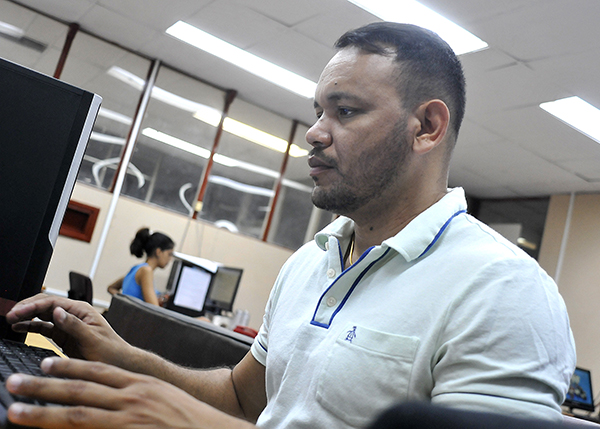
Photo: Abel Rojas Barallobre
We agree that we must work on the subject of communication with great care and ensure that the messages arrive with the greatest clarity and, above all, that there is no “imposition” or “publicity” look. Placing issues related to sexual orientation or gender identity in the media is as legitimate as so many others. It is a human right to be able to develop in all senses, without stigma and discrimination.
It is not a question of making comparisons between heterosexuals, homosexuals or trans people. The essence of the reflections is aimed at respecting the rights of all from their singularities of expression.
Trans people and homosexuals have seen their rights violated by not “complying” with established codes that only socially legitimize heterosexuality as a form of expression. Many rights in heterosexual people are already naturalized and should not be pronounced in their defense, this is not the case for non-heteronormative expressions.
It is not a question of proclaiming the individual characteristics of each one, but when because of these singularities human beings are unable to develop, then it must be said and emphasis must be placed on the achievement of rights, in these cases sexual rights as human rights.
You mention a situation that is painful, but it is only an effect of discriminatory and stigmatizing postures that are structured in society. Trans people often choose to only go out at night for all the manifestations of ridicule, laughter, choteo, harassment and bullying to which they are subjected during the day, and that is also shameful because it does not speak well of a people like ours.
We are talking about people in whom it has been demonstrated that their family, school and work environments are constantly being violated.
And, in relation to prostitution, you will agree that as a reflection in society it is multicausal, it is a phenomenon that generates violence around it and is not exclusive to trans people, but is reflected equally in men and women.
We are called to think about and not stigmatize anyone because of sexual orientation or gender identity. There are problematic people, eccentric, decent or not, of all kinds, and it does not depend on their sexuality. But sexuality, as a device of power, if it causes discomfort to people who are not heterosexual. I agree that we must work to avoid all these manifestations.
When we talk about these issues with Respect we cannot describe them as “homophobia or transphobia”, we are human beings who dialogue on the basis of equality and who have the firm intention of generating a social project that is evidently more inclusive.
Javier Alejandro: What does Mariela Castro consider to be the main public policy issues benefiting the LGBT community and why are the responses not advancing faster?
 Mariela Castro Espín: Designing public policies is a complex and difficult process, first it requires preparation to know how to do it on a scientific basis from specialized cinemas, institutions that have this social mandate, after approval the participation of other social actors must be organized. Cenesex has proposed strategies as public policies to address the rights of LGBT people in Cuba. We have advanced in some objectives that are opening steps to achieve others. An example: That the objectives and principles approved in the policy of the PCC have included non-discrimination on the basis of sexual orientation and gender identity. This policy is being translated into concrete actions. The campaigns developed by Cenesex contribute to generating social awareness to help the population understand these objectives and overcome their prejudices. Consensus is important so that these tasks are not [just] formally fulfilled. Previous campaigns served to draw attention to the responsibilities of families after work and union activism in favor of these rights. We are now drawing attention to the role of schools where we know there are situations of homophobic and transphobic harassment. The proposals being prepared at the legislative level are an important part of these concrete actions. Social policy is a strategy of intervention from the political power over social relations. When a policy is designed, there are objectives of immediate, medium and long term scope, and the changes in consciousness, in culture, to achieve change in social relations occur slowly. There will always be a party that opposes and resists, so we must maintain diverse spaces to continue the dialogue and build consensus.
Mariela Castro Espín: Designing public policies is a complex and difficult process, first it requires preparation to know how to do it on a scientific basis from specialized cinemas, institutions that have this social mandate, after approval the participation of other social actors must be organized. Cenesex has proposed strategies as public policies to address the rights of LGBT people in Cuba. We have advanced in some objectives that are opening steps to achieve others. An example: That the objectives and principles approved in the policy of the PCC have included non-discrimination on the basis of sexual orientation and gender identity. This policy is being translated into concrete actions. The campaigns developed by Cenesex contribute to generating social awareness to help the population understand these objectives and overcome their prejudices. Consensus is important so that these tasks are not [just] formally fulfilled. Previous campaigns served to draw attention to the responsibilities of families after work and union activism in favor of these rights. We are now drawing attention to the role of schools where we know there are situations of homophobic and transphobic harassment. The proposals being prepared at the legislative level are an important part of these concrete actions. Social policy is a strategy of intervention from the political power over social relations. When a policy is designed, there are objectives of immediate, medium and long term scope, and the changes in consciousness, in culture, to achieve change in social relations occur slowly. There will always be a party that opposes and resists, so we must maintain diverse spaces to continue the dialogue and build consensus.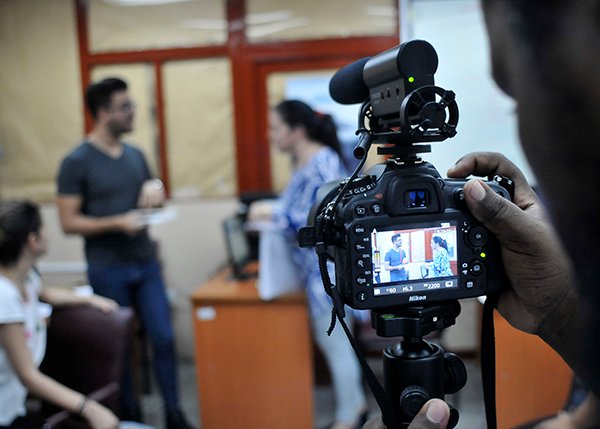
Jjsdjsdsd: The new family constructions, challenge for the Law was a work that was recently published in our press. On the subject, I would like to know why family diversity, which as we all know exists, is not recognized in Cuban law.
Manuel Vázquez Sejido: The new family configurations, although not so new and more visible today, are precisely the expression of a social reality evident in our context that must be regulated legally. This juridical regulation is not a vain question but obeys the need to recognize and guarantee the rights of all people in a socio-political system that is defined and has been characterized since 1959 by the constant search for social justice and equality for all. Although much progress has been made, there are still prejudices that hinder decision making and even the very interpretation and application of our current legal norms. The need to modify the current Family Code has been an issue put on the debate table from activism, but also from academia; civil society organizations such as the Federation of Cuban Women and the National Union of Jurists of Cuba have worked very seriously on a modification proposal that has been taken as a reference by the legal-political group of the National Sex Education Program (ProNESS) to present this and other legislative proposals in relation to the recognition of sexual rights as human rights. It is for this reason that it is so important to implement educational processes for the diverse groups of our society in order to deconstruct the cultural and imaginary social patterns that generate resistance, the norms themselves do not assure changes in consciences, they need changes in our “ways of acting” that allow the respect of legally regulated rights.
María: For several years there has been talk of a draft Family Code, which will come with new proposals and among them there is talk of unions between people of the same sex, why this proposal has been delayed so long, where it is deceived, why they have not just defined what is going to be done, I believe that Cuban society is prepared for this issue.
Manuel Vázquez Sejido: This question is related to an earlier one, only to add that I fully agree with you in stating that our society is ready for them and, even if it were not, these issues are human rights issues for one group of people and therefore you should not wait for another group to “agree” with your recognition. However, legal norms when supported by majorities have greater legitimacy and definitely a greater chance of being respected by those to whom they are addressed.
Elianet Carrazana: Good morning, I would like to know if Dr. Mariela Castro Espín is aware of the Autoexclúyete campaign. Are the requirements that this Blood Bank establishes for a donation really reasonable? How have we been able to publish that people who “practice homosexuality, bisexuality and sexual promiscuity” should feel unfit to perform such a human act as donating blood? It is truly a disappointment and a pity that this and even more so in the midst of the 10th Conference against Homophobia and Transphobia. Thank you.
Francisco Rodríguez Cruz: The denunciation made by the newspaper Escambray was the immediate object of the attention of Cenesex, which immediately received the concern through several activists. According to Deputy Director Manuel Vázquez Seijido, when answering a question similar to his during the conference of Dr. Mariela Castro Espín at the University of Computer Science, this concern was transferred directly to the office of the Minister of Public Health and the Vice-Minister of Medical Assistance, because we share the same concern about the discriminatory nature of this banner, whose letter and spirit would violate Law 41 that regulates the public health system in Cuba. As soon as there is a response, we will make it known.
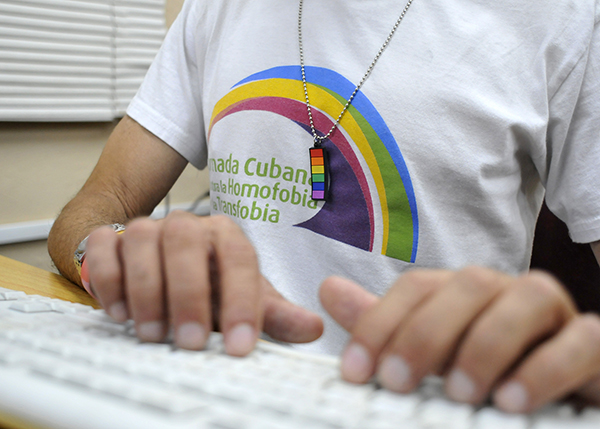
Photo: Abel Rojas Barallobre
Carlosvaradero: Why, despite progress in LGBT rights, is there still harassment of homosexuals by PNR members? If they aren’t doing anything in a certain place, just gathered, the police arrive and ask them for identification as if they were criminals? However, another criminal act can happen nearby and the police never appear or turn a blind eye? Why this harassment? I would like Mariela to be able to talk about it at some point. Thank you.
Manuel Vázquez Sejido: The Ministry of the Interior has been one of the ministries with which we have had a closer rapprochement as part of our sensitization workshops on issues related to Comprehensive Sexuality Education, Sexual Health and Human Rights, including, of course, sexual orientation and gender identity. Within the Ministry of the Interior, the General Directorate of the National Revolutionary Police (DGPNR) has been key and a fundamental ally; its chiefs have supported these processes of training their forces, however, we have not achieved all the desired results. It is a complex process to deconstruct rigid thought systems that drive homophobic and transphobic behaviors, then the instability in the forces and in particular those officers who are in contact with the general population further complicates the issue. Definitely, although we have advanced in this point, if we make a quick comparison with the panorama of 10 years ago, this is an issue that is still pending and to which we must continue to pay special attention.
Carlosvaradero: What is the country’s political will regarding same-sex unions? The subject is touched upon, but there is never anything clear about it, it is as if one avoids speaking about the subject by those who have to decide about that subject. Thank you!
Manuel Vázquez Sejido: Your question is a broad one, I have preferred to answer it by taking as a reference a transcendental political decision in recent years and that, personally, I identify as a clear expression of the political will of our State. I am referring to the documents that emerged from the VII Congress of the Communist Party of Cuba in which equality and non-discrimination are understood as a fundamental pillar for the development of the prosperous and sustainable nation to which we aspire; in these, the illegitimacy of discrimination based on sexual orientation and gender identity is clearly addressed and this will undoubtedly guide the political decisions that are adopted from this moment on.
Juana T.: Does the Cuban Penal Code take into account homophobic and transphobic bullying in the school environment? Do you have any proposals in this regard?
Pedro:
Francisco Rodríguez Cruz: On his first concern, we already offered an answer to the commentator Elianet, in question 13. His other question was also answered by the deputy director, Manuel Vázquez Seijido.
Sachiel: Good morning, sir. I hope that a similar campaign will be made against bullying in general, and not only this issue of homophobia and the like, but I also hope that someone from MINED and MES will be present in the debate. I very much agree with Yasmany (for me that is elitism and lack of awareness of those who preach and seek equal rights) and ask how to avoid acts of public disorder (dishonest exhibitions, sexual harassment, etc.) by LGBT people or groups; what education or procedure is followed for that by Cenesex and related, and what has been achieved in that sense.
Manuel Vázquez Sejido: Our campaign, although it draws attention to homophobic and transphobic bullying, starts from the understanding that this is a phenomenon that occurs in a more general context and that includes the victimization of people whose characteristics deviate from the hegemonic norms that rigidly organize our social dynamics, we are often victims because of our height, skin color, physical complexion, etc. The Ministry of Education is an important part of the actions that we are developing and the Ministry of Higher Education has shown its support, we cannot pretend that the changes take place automatically, because they depend on the changes that must be generated in our consciences.
Julio Alberto Gavilán: Once again I ask for your help to put an end to eight years of injustice. I was unfairly punished for separating from the sector, for sexual harassment of students that I have not been able to know who they are. In all instances, including the Public Prosecutor’s Office and MES, they argue that it is not necessary to present witnesses. I wonder where my rights as citizens have been respected. Please, I repeat, it is time to put an end to so much injustice that it has affected my health, my morale and my job without proof.
Manuel Vázquez Sejido: Julio Alberto: For a situation like yours, it would be more convenient if you would send us all the information possible and the allegations that you make to the legal orientation services of Cenesex, which operate on Wednesdays and Fridays, starting at nine o’clock in the morning, at our headquarters at Calle 21 esquina a 10, Vedado.
Juana T.: Does the Cuban Penal Code take into account homophobic and transphobic bullying in the school environment? Do you have any proposals in this regard?
Manuel Vázquez Sejido: The Cuban Penal Code has some penal figures that are linked to bullying in a general way and therefore allow criminal legal responsibility to be demanded for events of this type. For example, when bullying generates injuries, or is related to threats, coercion or is linked to lascivious abuse, rape, etc; it also has to do with a possible crime against the right to equality. However, it should be noted that the solutions provided by the penal code are partial, since the under-16s are not included in their cases, since they are not criminally responsible and, in addition, there is an important group of situations that may constitute homophobic or transphobic bullying that are not legally defined as crimes.
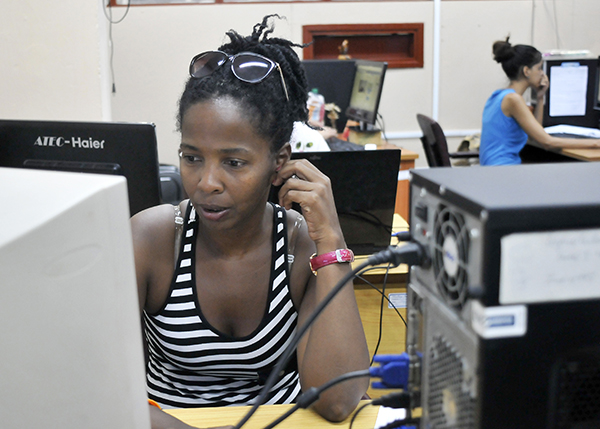
Photo: Abel Rojas Barallobre
Camila Fonck: Is there harassment in Cuban schools? How can one identify a child victim? Is it also possible to identify those who may become or are potential victimizers?
Yoanka Rodney: Yes, there is scientific evidence that allows us to affirm the presence of the problem in some schools.
They are children considered weak and unable to defend themselves. They are often teased by classmates or higher grades. In the case of those who attend primary school, they often complain to their teacher about the discomfort of their classmates. In our country, they are known as the hustle and bustle. Also, refusal to attend the educational institution can be associated as an indicator.
Potential aggressors are those children who are dominant, manipulators and controllers. They are those who intentionally and repeatedly annoy a particular peer or a group of them for various reasons. They can be negative leaders in the classroom and with a certain development of social skills that allows them to add followers and harass other classmates.
Lucifer: Hello. Good morning Mariela, first thank you for your hard work to get you the beauty and intelligence of your mother. First I would like to know, if CENESEX is thinking of an educational campaign to educate gays to reasonable behavior, I am a supporter that everyone should be as they like. If heterosexuals give each other a kiss on the street, which I think is wrong, everyone should express their affection to one another in private. If you plan to make more news with gay cut, almost in the news, or TV we see nothing that deals with gays. I wonder if they have a project to change this situation.
Susana Hernández: Hello Lucifer, for the National Center for Sex Education – as its name implies – educational campaigns are an essential tool. Throughout the year we broadcast messages about the universe of sexual health and rights through our own media, such as the website www.cenesex.org and the Facebook page Cenesex, but also through the national media in both informative and varied spaces.
The messages are as diverse as the topics the center works on and are not limited to LGBTI (lesbian, gay, bisexual, trans and intersex) issues. On the other hand, we share a broad vision of education, which goes beyond educating one group or another. Our goal is for society as a whole to share the importance of sexuality for the full development of the human being and to understand the multiple dimensions and forms that sexuality can present in each person.
Juventud Rebelde: Why are schools the main scene of this day against homophobia? How can homophobic and transphobic bullying be dealt with in the school environment? How is it possible to strengthen the sex education programme of the country’s school system?
Yoanka Rodney: Various international agencies such as UNESCO and scientific research in various countries say that homophobic bullying is a universal problem, affecting schools, the people involved and the quality of education. It is also recognized that the school is in charge of the integral formation of the younger generations and the space par excellence to ensure that from an early age people learn to relate to each other on the basis of respect, acceptance, sensitivity, and solidarity regardless of their sexual orientation or gender identity. For this reason, the system of influence carried out by teachers in collaboration with the family and the community plays an important role.
A situation of homophobic or transphobic bullying is faced with education, prevention, acceptance, solidarity, sensitivity, respect towards the other. Also using properly the school regulations which prohibit the use of teasing, rude jokes and hurtful words among peers. Another way of dealing with harassment is by implementing the Sexual Education with a Gender and Sexual Rights Approach program, in which the essential content includes addressing the issue of sexual gender violence and, in particular, that which is produced by sexual orientation and gender identity.
It also confronts by communicating to teachers and family members the situations of harassment they are experiencing so that they can take action. In any situation of harassment, including homophobia and transphobia, many students remain silent and at the mercy of their aggressors without receiving the necessary help.
The sexual education program is strengthened by educational activities that are designed, which should be aimed especially at students, teachers and families. Although it cannot be ignored that if the school is the most important cultural center of the community then the educational work to be developed by this socialization agency must reach the entire population. In the same way, it is strengthened with the collaboration of other socialization agencies, the participation of the media and civil society institutions.
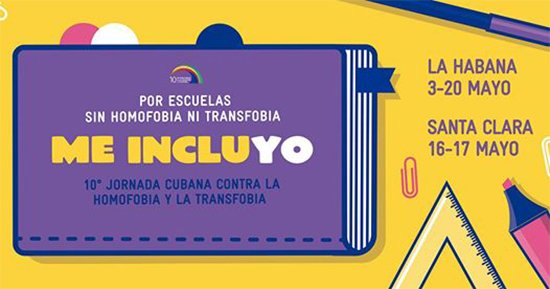
Lizandra: Who said the LGBT community is protected? I mean, I’ve lived with my partner for 20 years, if my partner gets sick and has no one to take care of her, do I get permission at work to take unpaid leave in order to take care of her? If she dies, after I am left grounded, do I have the right to the benefits that the law gives me to be able to be in the funeral home and that those three days that the labor code establishes do not exclude me? Noooo, because for the purposes of the law, it is nothing of mine, but if she dies, do I have the right to receive her salary? Do I have the right to inherit her property? The workers receive protection, through the Social Security System, in cases of illness, accident, disability and old age, if their death occurs, their relatives receive this protection, in accordance with the provisions of the Social Security Law or special regimes, as the case may be. In unpaid leave for workers, family responsibilities ARTICLE 108, Article 116 paragraph g) and others. On the other hand, I am a Spanish citizen and since in Cuba they have not just approved civil unions between people of the same sex, I cannot legalize the union with my partner in the Spanish Consulate; therefore, I cannot travel with her because the Spanish Embassy in Cuba cannot do anything because they are in Cuban territory and the union between people of the same sex is not approved in Cuba, since it makes it impossible for me to carry out any procedure of this nature. So is it fair or not that you have just approved this union? I think there are only taboos
Lizandra: It is only fair that homosexual people have the same opportunities and rights. If we hold these Cuban days against homophobia and transphobia, it is also because we are aware of how much progress remains to be made in terms of legal guarantees and inclusive social policies. Thank you for the examples you give us, which are very illustrative.
cristiano: Hello, I’m a Christian and I know I’m labeled homophobic because I’m against homosexual marriage, abortion and the adoption of minors by homosexuals, my question is: What do you think of the position that the majority of churches take on these issues? Would you be in favor of laws that censor the right of the church to proclaim its beliefs?
cristiano: Many of us respect people who have religious faith. In fact, we have alliances with Christian leaders in Cuba who have a different conception of respect for and inclusion of LGBTI people. In the long run, I believe that the churches and the people who are part of them will also advance towards an understanding of sexual diversity, because it is human, because it is just, because it is Christian. I don’t think we should criticize churches, or any institution or person who doesn’t understand our views. It is a question of offering arguments, scientific evidence and testimonies that help to understand, from the human sensitivity and spirituality that should characterize people with religious faith, and that we have the security that they would not want to harm any of their peers.e respect many people who have religious faith. In fact, we have alliances with leaders and Christian leaders in Cuba who have a different conception of the respect and inclusion of LGBTI people. In the long run, I believe that the churches and the people who integrate them will also advance towards an understanding of sexual diversity, because it is human, because it is just, because it is Christian. I do not think we should censor the churches, nor any institution or person who does not understand our views. It is about offering arguments, scientific evidence and testimonies that help to understand, from the human sensitivity and spirituality that should characterize people with religious faith, and we are sure that they would not want to harm any of their peers.
amance: What is Cenesex’s official position on a future approval of the adoption of children by homosexuals in Cuba?
Cenesex would agree that the same requirements and the possibility of adoption exist for all persons and types of families, regardless of their sexual orientation or gender identity. What matters is the happiness of girls and boys, and to guarantee them affection and protection.
Amanece: Homosexuality has always existed, but just in our time it is intended to assume that homosexual marriage is normal. Why is this? Will we be smarter than our predecessors? What consequences for all of society can equal marriage bring in Cuba?
Susana Hernández: Amanece, if as you state in your commentary “Homosexuality has always existed” then there should be no contradiction in assuming that marriage between two people of the same gender is a perfectly possible option.
That it is in our time and not in another that its legalization is promoted and achieved, responds to the same reason why women managed to vote for the first time in the nineteenth century and not in the time of Greece or Rome.
History has its processes, and although we would like rights to be recognized only by the fact that we have them, it is sometimes necessary for leaders to emerge to defend them and social movements to promote and demand them. These movements have achieved that in many countries of the world the equal marriage is already a legal fact and not only social.
In Cuba, thanks to the work of institutions such as Cenesex, sexual rights activists, and entities such as UNEACand ICAIC that through art have assumed the mission of sensitizing the Cuban people on these issues, marriage equality could be an ever closer option for those who wish it.
On the consequences for Cuban society, there will be only one: Cuba will be a fairer country and the people who live there will be happier.
MfasT108MPH: I am heterosexual but because of my upbringing I was educated to respect the right of others to be as they please people, as long as those people do not affect those around them and they behave correctly as human and social beings, that has helped me to see all people without contempt or discrimination, there has always been the rejection of some people towards others for being “different”, but that is the human essence, the diversity of all kinds, of culture, religious, skin color, sexual preference and all kinds…. that’s why I consider that discrimination is of one type only… DISCRIMINATION… what tries to frame or identify society today is the possible “origin of rejection”… of course, there is discrimination by gender, purchasing level, social origin or origin, skin color, religious belief, by habits and customs that mark living in a given territory of a country or as in the case analyzed rejection by sexual preference, even, rejection can be for infinite causes depending on how retoncida can be the people who focus more on what separates us than on what unites us…. clarifying this I would like to say that I consider that many mistakes are being made in these diversity campaigns… I have even discussed this issue with a gay friend who has a stable partner with whom he lives, both are professionals and people whom I consider men, because as I once said “what you do in bed is your business, what matters to me is how you are as a person” and in effect is good son, good brother and good friend, finally I consider that the campaigns should be against HOMOPHOBIA which I support 100% and I applaud the efforts made by the country, but neither should be these campaigns in favor of homosexuality, practically is stimulating the new generations with quite graphic propaganda, is posed as a NORMAL behavior…. as my colleague said, “I know that my behavior may not be normal because the normal thing would be to look for a woman who is biologically designed to give me a child and pleasure, but this is my decision and my preference”… I defend and support that because everyone should live their life as they wish… but neither should we promote the practice of homosexuality as if it were something normal… let’s not go to extremes, because as good Cubans, if we don’t get there we go too far…. I think we went from making life impossible for gay people to the point of almost stimulating homosexual practice… it is against homophobia but not in favor of homosexuality… they should give legal guarantees as has been commented for those who live together, I don’t think that the constitution should be modified to guarantee the rights of gay couples, if they want to have a ceremony, they should go on a honeymoon…. I also consider that when there is a small group of gay people in a place and the police arrive as one participant said, of course they can be asked for documentation like any other group of ordinary people… are ordinary people, I think that many times gay people in search of making a difference just bury themselves more by adopting in many cases rejectable positions in any kind of people (heterosexual), there are attitudes they adopt that are socially inadequate and then hide in the HOMOPHOBIA to do what gives them THE WIN…. let’s not get lost in concepts, signs of affection should be regulated in both heteros and homos … I hope no one has felt pleased but that’s what I think, the only way to avoid abuse in schools is with patience and changing mentalities over time, do not think that changing mentality is something of two days … my vote is AGAINST HOMOPHOBIA BUT NOT FOR HOMOSEXUALITY … greetings and NO!!!! TO DISCRIMINATION AND REJECTION OF ANY KIND
Angela: Hello MfasT108MPH, immediately obvious in your speech is the notion that homosexuality is not normal and that is apparently the point we should debate, especially when it is clear that you are a person with a social conscience.
If the only function and/or nature of human sexuality were reproduction, we would have sexual relations only at a certain time of the month, and only between the male and female of the species. I imagine that if this were the only function of sexuality, history would not contain so many efforts to control, regulate and repress it; it would not have been made a central theme in religious ideologies nor would the pornography industry have been so successful, it would not have been a “thorny” theme of sex education in schools….
The diversity of expressions of human beings in the matter of sexuality is a fact, it is the proof that human sexuality is much more than reproduction, but this, paradoxically, appears as difficult to understand even when it is widely accepted that the human being is bio-psycho-social. We are in charge of pathologizing, from different structures, those manifestations of sexuality that do not correspond with the purpose of reproduction and we do this, in most cases, uncritically and thinking that it is not discrimination.
In this crusade to maintain the paradigm of reproduction as ruler of our sexuality we forget that we share our feelings and bodies with other people also for pleasure, which has been ignored and even condemned from some ideologies. It is lawful and not pathological to desire, to love, to have sexual relations with other human beings who consent to it and, moreover, it is best to do it in a responsible way.
For Cenesex it is a duty to defend the right of people to express their sexuality freely and responsibly, to promote respect, sensitivity, and understanding. We are against homophobia and, on this path, it is necessary to focus positively on non-homo-normative sexualities because only by understanding that these are neither aberrant nor abnormal will violence cease.
The comment “I don’t care what you do in bed” is a whole declaration of principles on the subject, it is a veiled mode of discrimination, it says: I accept you if I forget what you do in your private space, moreover, leave it there because it is shameful, it belongs there. Homosexuality is not something to be ashamed of, something to hide from the world, something that indicates less capacity or competence. Homosexuality is one of many ways of being human and is as appropriate for public space as other sexual orientations.
From this dialogue, I prefer to keep what we have in common, which is a resounding NO to discrimination, and I invite you to reflect on the theme of “normality”, which is the basis for so many actions of this kind.
Adrián: I really respect you, but you should consider in this country where we’re going.
Mariela CE: We are moving towards an increasingly just society, with policies that benefit all people in their different realities and needs. Today scientific development can better clarify the historical origin of discrimination based on sexual orientation and gender identity or expression and provides new arguments and references for society’s policy and normative system.
We do not promote homosexuality but neither do [we promote] heterosexuality, we do not promote any type of sexual orientation or gender identities, we only educate in universal ethical principles, we offer elements of analysis and reflections on human realities and sufferings that must be dealt with in solidarity, not from the position of power in which hetero-normativity places us (which was also consolidated in the 19th century). Many people feel peace and tranquility because they identify comfortably with these norms, but also many people feel uncomfortable, unfortunate and rejected because they do not have the backing of the norm. According to international studies on social perception, the viewpoint divulged by Medicine that these people are sick, contributed to developing the stigma and discrimination, also expressed in the laws that punish them unfairly. The International Day Against Homophobia is celebrated to distinguish the decision of the World Health Organization (WHO) to consider homosexuality an expression as valid as heterosexuality. For people to be able to live fully as subjects of rights these regulations must be modified not only in the letter of the laws but also in the symbols with which our thoughts, emotions, feelings and behaviors operate, and this is what we are dealing with.
Cuba is considered one of the most advanced countries in the world because of the guarantees offered by the State to the exercise of the sexual rights of the population, especially women. These achievements are the results of the historical struggles of women with the support of other progressive forces; they are the result of the actions of the FMC and the policies of the Revolution. The free, professional and voluntary interruption of pregnancy insurance services provided by the National Public Health System, since 1965, has contributed to a significant decrease in women’s mortality from these causes, fulfilling one of the reasons why this service was established: to save women’s lives. Another reason was to guarantee the respect of the woman to decide about her body, because we have soul, conscience and also (like men), capacity to exercise autonomy. It is precisely the integral education of sexuality that is aimed at developing the reproductive responsibility of men and women, which contributes to avoiding unwanted pregnancy and also to training to exercise maternity and paternity in a responsible manner, among other objectives.
Facilities for consensual unions, marriage and divorce, recognition of sons and daughters, among many other rights, are conquests of society; they are acquired freedoms.
END OF TRANSCRIPT
Subscribe to Blog via Email
| M | T | W | T | F | S | S |
|---|---|---|---|---|---|---|
| 1 | ||||||
| 2 | 3 | 4 | 5 | 6 | 7 | 8 |
| 9 | 10 | 11 | 12 | 13 | 14 | 15 |
| 16 | 17 | 18 | 19 | 20 | 21 | 22 |
| 23 | 24 | 25 | 26 | 27 | 28 | |


You must be logged in to post a comment.